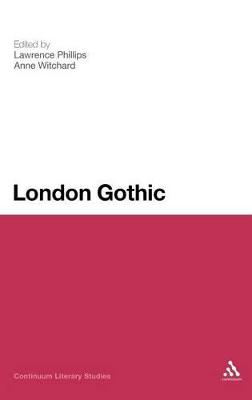
London Gothic: Place, Space and the Gothic Imagination
(Hardback)
Available Formats
Publishing Details
London Gothic: Place, Space and the Gothic Imagination
By (Author) Dr Lawrence Phillips
Edited by Dr Anne Witchard
Continuum Publishing Corporation
Continuum Publishing Corporation
23rd September 2010
United States
Classifications
Tertiary Education
Non Fiction
Literary studies: c 1900 to c 2000
820.9358421
Physical Properties
Hardback
208
Width 156mm, Height 234mm
Description
London has taken a central role in urban Gothic, from key canonic texts like Strange Case of Dr Jekyll and Mr Hyde, The Picture of Dorian Gray and Dracula through modern Gothic texts to the 'tourist gothic' of rebranded gastropubs and ghost tours.As a specific category, London Gothic is becoming as important for understanding ourselves today as it has been for thinking about the cultural productions of the late-nineteenth century. This is the first book to focus on Gothic representations of London, offering a range of essays from established and new scholars reading London Gothic as it is manifested in a variety of media and through varied critical approaches.
Reviews
Anne Witchard and Lawrence Phillips's compelling collection of essays locates the Gothic from the late 19th century to the present squarely in London geography from Bloomsbury to the suburbs. London Gothic develops a social analysis of the Gothic through novels, film and performance by drawing on a stimulating array of theoretical perspectives, from urban mappings to ecocriticism, thus contributing significantly to the study of the representation of London in literature and culture.' -- Susan Alice Fischer, Co-Editor, Changing English: Studies in Culture and Education
""Gothic London" may be, as one the authors in this volume claims, a "fabulation of tourist operators," but London Gothic is a wide ranging and provocative collection of essays. From the sparsely populated suburban wasteland of a mid-nineteenth-century St. John's Wood, to the Thatcher-era "monument to . . . the supremacy of the motor car," the M25, to a post (zombie) apocalyptic Canary Wharf, London Gothic offers fascinating accounts of the places and spaces of the Gothic. The collection not only reveals unexpected urban and suburban locations for the uncanny and the revenant but theorizes usefully our imaginative experiences of those locations and our affective investments in the ubiquitous and contested genre of the Gothic. While the essays in this collection provide strikingly diverse accounts of London's Gothic, they also speak to each other in a lively and multifaceted conversation about what the Gothic has meant and continues to mean as a cultural mode." -- Anna Maria Jones, Associate Professor, Department of English, University of Central Florida, USA
The high quality of the material was to be expected... but it is rare for an edited collection to touch on so many different socio-cultural loci and still break new ground.' -- Xavier Aldana Reyes
...the contributors know the gothic tradition well and place their analyses in appropriate critical and historical discourse. Scholars of the 20th- and early-21st-century gothic tradition will appreciate the analysis of a wide range of threats occurring within metropolitan London--vampires, zombies, mutant creatures, and ghosts... These well-researched essays will provide readers with insights into the role of the urban as setting, atmosphere, and antagonist in the gothic. Summing Up: Recommended. Lower-division undergraduates through faculty. -- CHOICE
Useful for scholars of the Gothic as a whole or studies of the city of London, London Gothic provides a fascinating look into the complicated narrative of the city's multifaceted past and present. -- Routledge ABES
... this is an exciting collection of essays that productively unpacks a thriving area of academia's own doubts about itself. Our understanding of the term "Gothic" will greatly benefit from such an expansive consideration. -- Irish Journal of Gothic and Horror Studies, Issue 10
Author Bio
Lawrence Phillips is Head of Regents American College and Professor of English and Cultural Criticism at Regents University London, UK. His recent publications include London Narratives: Post-War Fiction and the City (2006) and, as co-editor, Angela Carter: New Critical Readings (2012). Anne Witchard is a Lecturer in the department of English and Linguistics at the University of Westminster, UK. She is author of Thomas Burke's Dark Chinoiserie (Ashgate, 2009).
